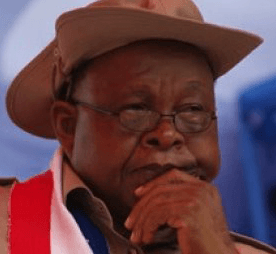Speaker commends STAR-Ghana for supporting Parliament

Professor Aaron Mike Oquaye, the Speaker of Parliament, has commended civil society organisations (CSOs) for their immense contribution to the House.
He praised CSOs such as STAR-Ghana for their support to Parliament over the years and appealed to the organisation to continue to support and build the capacity of the Legislature.
Prof Oquaye gave the commendation at the signing of Partnership Framework and Memorandum of Understanding (MOU) between Parliament and STAR-Ghana.
The first phase of the partnership was from 2012 to 2015, with STAR-Ghana providing technical and grants support to target grantees of Parliament.
The aim was to help strengthen Parliament’s capacity to effectively fulfil its legislative, oversight and representational roles and contribute in the long term to the deepening and consolidation of democratic governance.
The phase II of the STAR-Ghana programme, which would end in 2020, places a greater focus on achieving strategic and systemic level impacts.
It would support the creation, utilisation and institutionalisation of spaces for collective civil society engagement.
The result is expected to increase the accountability and responsiveness of the Executive and key state institutions at both local and national levels to the citizenry.
Consequently, Parliament and STAR-Ghana agreed on a two-year framework for collaboration.
The collaboration, which runs from 2017 to 2018 focusses on support to targeted units of parliament.
These are the leadership of the House, selected oversight committees and the parliamentary service.
It is expected that the collaboration would lead to enhancing the effectiveness of Parliament to discharge its constitutional mandate and contribute in the long run to deepening and consolidation of democratic governance.
Prof Oquaye expressed the hope that STAR-Ghana would continue to provide more support to strengthen the other departments of Parliament.
He announced that the Parliamentary Service Board intended to setup two new units- the Legal Department and Committee on Parliamentary Assurance.
He explained that the new legal department was to help Members of Parliament (MP) work on private member’s bill which Parliament intended to introduce while the committee on parliamentary assurance is to do a follow-up on statements made by members on the floor of the House.
Mr Haruna Iddrisu, the Minority Leader stated that the signing of the MOU was to strengthen the House in its work and to make it more responsive.
He said a stronger Parliament made better democracies.
He said the partnership was to build the capacity of MPs who were not experts in a particular field to build their competences.
He observed that since the prorogation of the 1992 Constitution and the institutionalisation of the first to the seventh Parliament the exercise of oversight had largely been driven by the opposition and not Parliament as a whole.
Mr Iddrisu expressed the need for the development of a new culture of parliamentary oversight that made the Executive or government more effective, transparent and accountable.
He urged STAR-Ghana to consider supporting Parliament to build the capacity of its members in the areas of Climate Change and the Environment especially in the wake of the recent illegal mining (galamsey) issues in the country.
Mr Osei Kyei Mensah-Bonsu, the Majority Leader whose speech was read on his behalf commended STAR-Ghana for the completion of the phase I of the programme.
He said it contributed significantly in enhancing the capacity of MPs on committees that benefited from the programme in the discharge of their functions.
He said the Committee on Government Assurance through the assistance of the programme was enabled to conduct public hearings and also undertook follow-up field visits to ascertain whether promises made by MPs or ministers on the floor of the had been fulfilled.
Mr Kyei Mensah-Bonsu noted that the Phase II of the programme was intended to focus on leadership of the House, four Committees of Parliament comprising Education, Local Government, Gender, Children and Social Protection and the Parliamentary Service.
He said Parliament was in the process of concluding the revision of the Rules of Procedure, otherwise known as the Standing Orders, which among others would provide for the restructuring of the Committees of the House.
He expressed the hope that the phase II of the programme would enhance the interface among Parliament, Executive, and civil society so as to improve upon parliament output.
Prof Akilakpa Sawyer, Chairman STAR-Ghana stated that the organisation, which was donor funded would insist on strict accountable and transparent process from the beneficiaries of the programme.
He said the way forward for STAR-Ghana at the end of phase II of the programme was to be an independent and nationally controlled body.
He said continuous reliance on donor organisations to fund the country’s political institutions was not sustainable.
Mr Ibrahim-Tanko Amidu, Programme Director, STAR-Ghana stated that the second phase of the STAR-Ghana programme was intended to increase transparency, accountability, the responsiveness of government to citizens at all levels of governance.
He said STAR II also focused on increasing the capacity of citizens and their organisations and their representation organisation to hold government accountable.
He said the main approach in the STAR-Ghana strategic framework was to help to convene dialogues on key national issues at all levels of governance.
Mr Amidu also stated that STAR-Ghana sought to increase civil society and parliamentary influence to foster better governance of public goods and services.
He said the goal of the programme was to support the development of a vibrant, well-informed and assertive civil society able to contribute to transformational national development and inclusive access to high quality, accountable public services for all Ghanaian citizens.
He said significant results were achieved at the end of the first phase especially in terms of strengthening Parliament’s capacity.
Source: GNA
